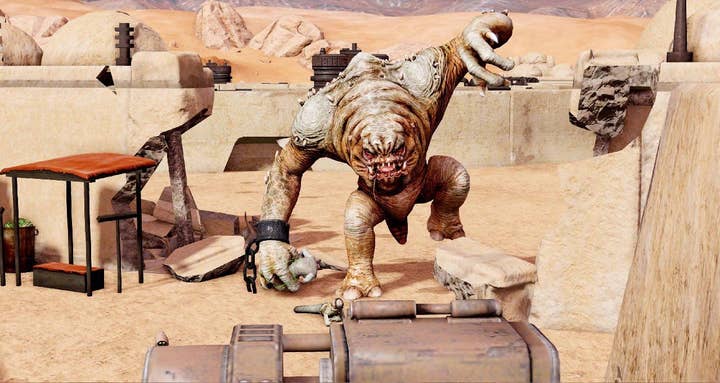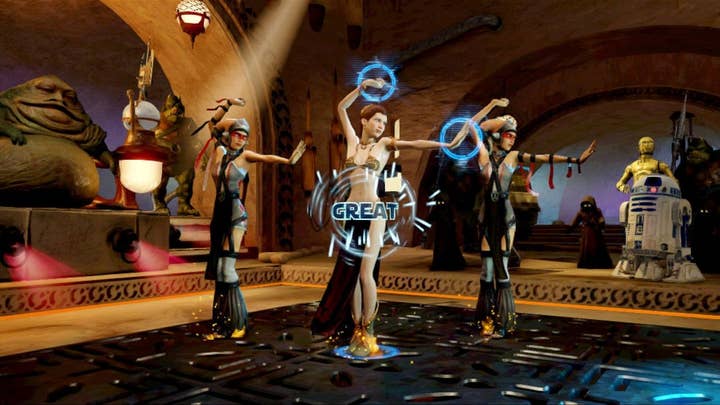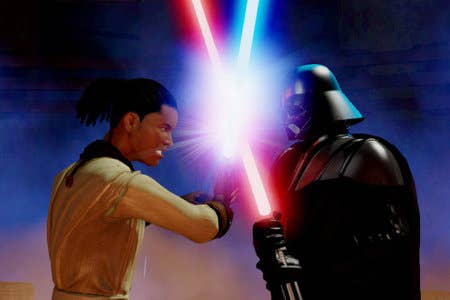Critical Consensus: Kinect Star Wars
Terminal Reality duels with the Kinect's shortcomings. Can the Star Wars license save the day?
Cast your mind back to E3 2010. Microsoft unveiled 'Project Natal', the full-body motion-sensing peripheral that promised to do nothing less than revolutionise the way we play games. The standard bearer for that promise was Lionhead's ultimately doomed Milo & Kate, but lurking somewhere in the back was a deeply unimpressive demo of a new Star Wars game. It looked bland, both visually and in terms of gameplay; What's more, it seemed to be running independently from the person frantically waving his arms on-stage.
Two years later and very little has changed. Kinect is still widely regarded as unfulfilled potential, we're still waiting for the game that will give us a taste of what Milo & Kate promised, and Kinect Star Wars is everything that E3 demo indicated and a whole lot more - or less, depending on which review you read.
VentureBeat's Dean Takahashi can see the good in Terminal Reality's labour of commercial necessity, as indicated by his 7 out of 10 score. However, while a 7 implies a good game - a solid recommendation - Takahashi's text seems to be describing a very different experience. Star Wars Kinect is energetic, intuitive and sporadically fun, but it's bad points vastly outweigh the good.
Inaccurate controls, poor storytelling, dull enemies, hollow characters, stilted dialogue, poor animations; the gang's all here. Commendable score notwithstanding, Takahashi is open and direct in articulating his disappointment.
"Like many other fans in the galaxy, I was willing to overlook little problems," he says. "After all, I grew up with Star Wars, and I share the common fantasy of one day becoming a Jedi Master. Unfortunately, Kinect Star Wars wasn't worth the wait.

"This flagship game confirms what I already knew about Kinect: It just doesn't work good [sic] enough to be as fluid and magical as it should be. Kinect isn't accurate at sensing your movements and translating them into precise controls. The sad thing is that this title had a lot of potential for a mass audience. Who wouldn't want to swing around a lightsaber and pretend to have Jedi powers? But the game just tries to be too many different things - a fun party game, a casual kids title, and a serious game for hardcore players and adults - and doesn't deliver on all of them."
Eurogamer's Dan Whitehead voices similar concerns, though he awards a less jarring 5 out of 10. Star Wars Kinect is a "half-hearted grab bag of ideas" that plays like a greatest hits: there are Jedi duels, speederbikes,. podracing, and liberal opportunities to swing a lightsaber and use the Force while being pushed around on-rails. You can demolish cities as the terrifying Rancor, and, er, make Darth Vader do The Robot in a dancing mini-game. Really.
Kinect Star Wars is an incoherent and clumsy compilation, one driven more by brand synergy than any creative imperative
Dan Whitehead, Eurogamer
Indeed, Whitehead credits the incongruous dancing segments as a high-point. Not only do they represent the only moments that Terminal Reality approaches something close to originality, they also use the Kinect in a way that's proven to work. Unfortunately, the same can't be said of the game's more prosaic distractions.
"Control is clumsy and vague," he says, "while Kinect simply can't cope with any fancy fighting moves. So you're stuck with broad, simple strokes, but even then it feels like the action on-screen is always one move behind what you're actually doing.
"You can jump to somersault over enemies, while leaning side to side dodges. Leaning forwards while stretching your arms behind you supposedly propels you forwards in a Force Rush, but, like most of the interactions more complicated than waving your hand from side to side, the game only reacts sporadically or else misreads your moves completely.
"It's one of those experiences where you can see what developer Terminal Reality was aiming for but the gulf between expectation and execution remains distractingly large. Combat is a fumble, accuracy is loose and unsatisfying, and you're constantly aware that for the most part progress comes about because the game keeps dragging you forwards.
"Overall, Kinect Star Wars is an incoherent and clumsy compilation, one driven more by brand synergy than any creative imperative."
In that last statement, in particular, Whitehead is absolutely correct: Kinect Star Wars is an unashamedly commercial venture, and that isn't necessarily a criticism. Indeed, chasing a mass audience is arguably the only reason why anyone still works with the Star Wars license, and it's entirely conceivable that Kinect Star Wars will be a hit regardless of how many critics lament its numerous weaknesses.

However, it's worth remembering that VentureBeat and Eurogamer are specialist websites, with far loftier expectations than the broad target audience for a product like Kinect Star Wars. VentureBeat's combination of high-score and negative language fits neatly with the idea that, for many specialist outlets, a 7 can effectively be interpreted as "average." But for a site like Digital Spy, which has a broader remit and a mass market focus, both score and text reflect a far more positive experience.
"For many of us, Star Wars is the sole reason Kinect and every other motion controlled gaming device was invented," says Liam Martin in his 4-star review. "Any peripheral that could take us one step closer to life in a galaxy far far away was always going to be welcomed with open arms, even if so far, the farthest we've travelled is back to town to nab a refund.
"Despite containing five game modes, to call Kinect Star Wars a mini-game compilation would be to do it a disservice. The development team has clearly invested a lot of time and effort ensuring that each game can stand on its own two feet. Yes, some modes are better than others, but none appear to have been hastily churned out or overlooked in favour of another."
Martin doesn't ignore the problems highlighted by VentureBeat and Eurogamer - the control issues are rightly taken to task - but their importance withers in the face of the pure nostalgic pleasure of being in the Star Wars universe. To some degree that's inherent to the license, and, seasoned critics would argue, a rather hollow victory for Terminal Reality.
But in this context it's the difference between millions of sales and another worthy curio to keep Child of Eden and The Gunstringer company. It doesn't take a genius to predict which Microsoft would see as a better example of a job well done.









